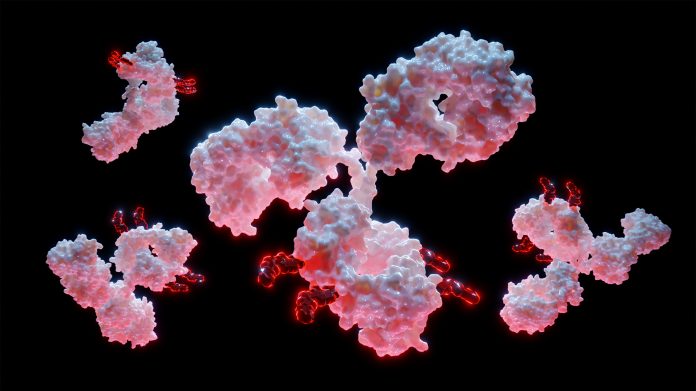
Bristol Myers Squibb joined the antibody-drug conjugate (ADC) rush as it announced an agreement with Tubulis to develop differentiated ADCs using the company’s proprietary P5 conjugation platform. The deal covers the development of a selected number of highly differentiated ADCs to treat solid tumors.
There are already more than a dozen ADCs approved and more than 800 trials of them ongoing. But the field heated up this spring when in March, when Pfizer scooped up ADC specialist Seagen for $43B. BioNTech quickly followed with a potential $1.5B deal with Duality Biologics. The world market for these drugs is estimated to be almost $5B and to climb to more than $18B by 2030.
This deal with BMS will net Tubulis an upfront payment of $22.75 million plus a potential $1 billion in development, regulatory, and commercial milestone payments plus royalty payments on resulting marketed products.
ADCs comprise a monoclonal antibody (mAb), a chemical linker, and a cytotoxic payload. This creates highly specific targeting ability and potent killing effect.
“ADCs play a promising role in cancer therapy, and Tubulis’ differentiated technologies offer opportunities to overcome current challenges in the development of safe and effective ADC therapeutics,” said Emma Lees, PhD, Senior Vice President, Research and Early Development and Head, Mechanisms of Cancer Resistance Thematic Research Center at Bristol Myers Squibb.
This is not BMS’s first foray into ADCs. In 2021 the company paid $650M for the rights to Eisai’s folate receptor alpha-targeted ADC MORAb20 (now, Farletuzumab ecteribulin). That deal was announced to be worth up to $2.5 billion in milestones.
“With the P5 platform, we will be able to pair the right antibody with the right payload and thus provide potential for meaningful therapeutic benefits for patients with solid tumors. We are looking forward to a fruitful partnership with the Tubulis team,” Lees said.
Bristol Myers Squibb will gain exclusive rights to access Tubulis’ Tubutecan payloads in combination with Tubulis’ proprietary P5 conjugation platform. The company says its P5 and Tubutecans facilitate the generation of ultra-stable ADCs that have the potential to actively reduce unwanted target-independent toxicities and are optimized for on-target delivery of potent topoisomerase-1 inhibitors. It says its proprietary platforms are “completely new conjugation technologies, that allow us to overcome the main limitations of ADC technologies.”
These limitations, Tubulis says, are target-independent toxicities, such as premature payload loss and unspecific cell uptake and restricted design space to match target biology with appropriate payload class and the right drug-to-antibody ratio.
Following antibody target selection by Bristol Myers Squibb, Tubulis will provide the company with its linker-payload to generate a uniquely matched ADC for each antibody. Bristol Myers Squibb will assume sole responsibility for development, manufacturing, and commercialization of the resulting ADC candidates.
“This strategic agreement with Bristol Myers Squibb is an important validation of the potential of our approach in developing next-generation ADC-based therapeutics and our cutting-edge ADC conjugation technologies that accommodate advanced ADC design to tackle tumors with high-unmet medical need,” said Dominik Schumacher, PhD, CEO and co-founder of Tubulis.













